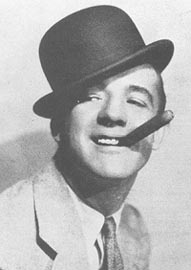Encyclopedia Dubuque
"Encyclopedia Dubuque is the online authority for all things Dubuque, written by the people who know the city best.”
Marshall Cohen—researcher and producer, CNN
Affiliated with the Local History Network of the State Historical Society of Iowa, and the Iowa Museum Association.
FRISCO, Joe
FRISCO, Joe. (Rock Island, IL, 1890-Hollywood, CA, Feb. 12, 1958). Frisco, actually a Dubuque resident named Louis Joseph, developed celebrity status in Broadway vaudeville and later MOTION PICTURES by making the most of his pronounced stutter and his flashy jazz dancing.
Joe was barely into adolescence when he hit the road, hopping a freight train and winding up in Milwaukee where he was part of an act called "Coffee and Doughnuts." Joe was Doughnuts. Frisco performed with some of the first jazz bands in Chicago and New York City, including Tom Brown's Band from Dixieland, the Original Dixieland Jass Band, and the Louisiana Five. (1) He claimed to be the “World’s First Jazz Dancer”, and “the Frisco dance” or “Jewish Charleston” became the most widely imitated dance in the country. (2)
The great American novelist, F. Scott Fitzgerald, mentioned him in The Great Gatsby when describing one of Jay Gatsby's parties: (3)
"Suddenly one of these gypsies in trembling opal
seizes a cocktail out of the air, dumps it down
for courage and moving her hands like Frisco
dances out alone on the canvas platform.
In 1918, he broke into Ziegfeld’s Midnight Frolic, which he continued to play, along with the Follies, Earl Carol’s Vanities, and Big Time vaudeville into the early 1930s. (4) One of the highlights of this act was the dialogue he began to introduce. Despite the stuttering (or perhaps because of it), he developed a reputation as a great wit. (5)
Once, when Bert Lahr was bragging at the Friar’s Club about taking numerous
curtain calls after a show in Kansas City (a town notorious for its
unresponsive audiences), Lahr wrapped up his story with an offer to buy the
drinks:
“What would you like, Joe?”
“I’d l-l-like to see your act!”
On another occasion, while waiting in the wings at a benefit show for found
himself standing next to Enrico Caruso, the great opera singer. He turned to
the famous tenor and said, “Hey, Caruso, don’t do ‘Darktown Strutters Ball’.
That’s my number and I follow you.”
One of his remarks, “Don’t applaud, folks, just throw money” continues to be
used by comedians.
In the 1920s, Joe Frisco played the major vaudeville houses and in the 1930s, the top restaurants clubs. In the 1940s, he moved to Hollywood. (6) The Darktown Strutters' Ball became Joe Frisco's theme. Once the orchestra started to play the tune as Frisco happened to enter a restaurant. Another happening occurred at a club when Bing Crosby sang the tune and Frisco danced. It was revived in the film "Atlantic City" in 1944, in a nightclub scene recreating Ziegfelds Follies. (7) In 1932 Frisco earned an estimated $4,000 weekly while making the movie The Gorilla. He last appeared in Sweet Smell of Success in 1957 with Burt Lancaster and Tony Curtis.
Despite his salary, Frisco's overdue bills, bets at the track, and income tax troubles were well known among his friends in the film industry. Although needing frequent loans from friends, an estimated twelve hundred well-wishers attended a testimonial dinner in his honor just weeks before his death.
Frisco's earliest performances are believed to have been in front of the Grand Theater in Dubuque where, during the early 1900s, he tap-danced hoping to attract attention.
<youtube>AgXLrmUjcj0</youtube>
<youtube>WlZaoL3P3f8</youtube>
---
Source:
Joe Frisco. YouTube user: AgXLrmUjcj0
Joe Frisco. YouTube user: WlZaoL3P3f8
1. "Mae West: Joe Frisco," http://maewest.blogspot.com/2011/02/mae-west-joe-frisco.html
2. Ibid.
3. Ibid.
4. "Marxology-Joe Frisco," http://www.marx-brothers.org/marxology/frisco.htm
5. "Joe Frisco," American Vaudeville Museum, http://www.vaudeville.org/profiles_A_H/index_files/Page375.htm
6. "Marxology-Joe Frisco"
7. Ibid.



